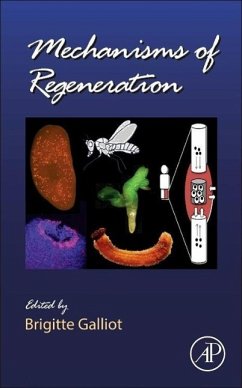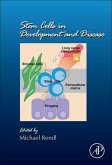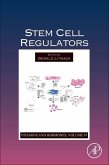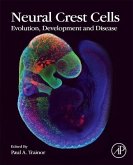Mechanisms of Regeneration
Volume 108
Herausgegeben:Galliot, Brigitte
Mechanisms of Regeneration
Volume 108
Herausgegeben:Galliot, Brigitte
- Gebundenes Buch
- Merkliste
- Auf die Merkliste
- Bewerten Bewerten
- Teilen
- Produkt teilen
- Produkterinnerung
- Produkterinnerung
This new volume of Current Topics in Developmental Biology covers the area of mechanisms in regeneration. With an international board of authors, it provides a comprehensive set of reviews covering such topics as control of growth during regeneration, skeletal muscle degeneration and regeneration in mammals and flies, and suppression of regeneration in mammals.
Andere Kunden interessierten sich auch für
![Stem Cells in Development and Disease Stem Cells in Development and Disease]() Stem Cells in Development and Disease168,99 €
Stem Cells in Development and Disease168,99 €![Stem Cell Regulators Stem Cell Regulators]() Stem Cell Regulators124,99 €
Stem Cell Regulators124,99 €![Stem Cells Stem Cells]() Christine L. MummeryStem Cells64,99 €
Christine L. MummeryStem Cells64,99 €![Epigenetics of Aging and Longevity Epigenetics of Aging and Longevity]() Epigenetics of Aging and Longevity98,99 €
Epigenetics of Aging and Longevity98,99 €![Epigenetic Gene Expression and Regulation Epigenetic Gene Expression and Regulation]() Epigenetic Gene Expression and Regulation75,99 €
Epigenetic Gene Expression and Regulation75,99 €![Neural Crest Cells Neural Crest Cells]() Neural Crest Cells83,99 €
Neural Crest Cells83,99 €![Muscle Biology Muscle Biology]() Bruce M. CarlsonMuscle Biology85,99 €
Bruce M. CarlsonMuscle Biology85,99 €-
-
-
This new volume of Current Topics in Developmental Biology covers the area of mechanisms in regeneration. With an international board of authors, it provides a comprehensive set of reviews covering such topics as control of growth during regeneration, skeletal muscle degeneration and regeneration in mammals and flies, and suppression of regeneration in mammals.
Produktdetails
- Produktdetails
- Current Topics in Developmental Biology Volume 108
- Verlag: Academic Press / Elsevier Science & Technology
- Artikelnr. des Verlages: C2011-0-07197-1
- Seitenzahl: 368
- Erscheinungstermin: 28. Februar 2014
- Englisch
- Abmessung: 236mm x 163mm x 25mm
- Gewicht: 700g
- ISBN-13: 9780123914989
- ISBN-10: 0123914981
- Artikelnr.: 40137192
- Current Topics in Developmental Biology Volume 108
- Verlag: Academic Press / Elsevier Science & Technology
- Artikelnr. des Verlages: C2011-0-07197-1
- Seitenzahl: 368
- Erscheinungstermin: 28. Februar 2014
- Englisch
- Abmessung: 236mm x 163mm x 25mm
- Gewicht: 700g
- ISBN-13: 9780123914989
- ISBN-10: 0123914981
- Artikelnr.: 40137192
My scientific interest has always been focused on the different aspects of development, from the first morphogenetic stages to the complex mechanisms of neurogenesis and regeneration. This led me to study medicine (Paris, France) and to start a medical career in the field of embryology and pediatrics. I however soon realized that my scientific interests could only be satisfied after a more complete formation in basic biological and biochemical sciences. My nomination as MD resident in Strasbourg hospitals gave me the unexpected opportunity to join one of the leading French laboratories in the field of molecular biology (Pierre CHAMBON) and to acquire a formation as a molecular biologist. After a Master in the biochemistry of transcription I started a PhD work in the field of molecular genetics of development, where I characterized transcription factors (Hox genes) involved in the establishment of the vertebrate body plan, using the mouse as a model system. Thereafter I joinedthe laboratory of Chica SCHALLER in Heidelberg (Germany) for a post-doctoral stage to study the molecular developmental biology of Hydra. This freshwater cnidarian polyp, which displays a rather simple apical to basal organization but differentiates a sophisticated nervous system and is capable of budding and regeneration, is a potent model system to study the biology of stem cells, the mechanisms of regeneration.
The discovery since 1984 that all animals share a similar complement of genes convinced me of the paradigmatic value of this little animal to understand some fundamental processes that support cell and developmental plasticity in metazoans. I started to settle a molecular biology approach, which led in the cloning of several transcription factors, homeobox- and bZIP-containing genes, unexpectedly similar to their vertebrate counterparts. Moreover their regulation during regeneration confirmed our hope that developmental pathways had been conserved throughout evolution. Since 1993, in my own laboratory at the University of Geneva (Switzerland), we focus on the signaling pathway(s) leading to the reactivation of a developmental program after injury, and to de novo neurogenesis in the adult Hydra. My double formation as MD and PhD in the field of human embryology and molecular developmental biology gives me the chance to appreciate the scientific advances from both sides, medical and biological. No doubt that in the coming years a better understanding of the cellular plasticity during regenerative processes will provide direct implications for facing human pathologies.
The discovery since 1984 that all animals share a similar complement of genes convinced me of the paradigmatic value of this little animal to understand some fundamental processes that support cell and developmental plasticity in metazoans. I started to settle a molecular biology approach, which led in the cloning of several transcription factors, homeobox- and bZIP-containing genes, unexpectedly similar to their vertebrate counterparts. Moreover their regulation during regeneration confirmed our hope that developmental pathways had been conserved throughout evolution. Since 1993, in my own laboratory at the University of Geneva (Switzerland), we focus on the signaling pathway(s) leading to the reactivation of a developmental program after injury, and to de novo neurogenesis in the adult Hydra. My double formation as MD and PhD in the field of human embryology and molecular developmental biology gives me the chance to appreciate the scientific advances from both sides, medical and biological. No doubt that in the coming years a better understanding of the cellular plasticity during regenerative processes will provide direct implications for facing human pathologies.
1. Mechanisms of Systemic Wound Response in Drosophila2. Dying to Go Through Again: Apoptosis and Regeneration3. Control of Growth During Regeneration4. Genomic Output Plasticity and Regeneration5. Re-Engineering Development to Instruct Tissue Regeneration6. Post-Embryonic Organogenesis of the Digestive Tube: Why does it Occur in Worms and Sea Cucumbers but Fails in Humans?7. Skeletal Muscle Degeneration and Regeneration in Mice and Flies8. Aging and Regeneration in Vertebrates9. Genetic and Epigenetic Controls of Plant Regeneration10. The Hormonal Control of Regeneration in Plants11. Mathematical Modeling of Regenerative Processes
1. Mechanisms of Systemic Wound Response in Drosophila2. Dying to Go Through Again: Apoptosis and Regeneration3. Control of Growth During Regeneration4. Genomic Output Plasticity and Regeneration5. Re-Engineering Development to Instruct Tissue Regeneration6. Post-Embryonic Organogenesis of the Digestive Tube: Why does it Occur in Worms and Sea Cucumbers but Fails in Humans?7. Skeletal Muscle Degeneration and Regeneration in Mice and Flies8. Aging and Regeneration in Vertebrates9. Genetic and Epigenetic Controls of Plant Regeneration10. The Hormonal Control of Regeneration in Plants11. Mathematical Modeling of Regenerative Processes








